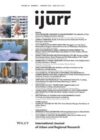The provision of tenure security for residents of informal settlements has been among the highest ranking and most debated topics on the development agenda. Some have fervently argued for the distribution of property title to establish security and generate incentives for investment in housing improvement. Others have argued that it is the security as perceived that determines whether and how much dwellers invest. This article examines the psychological pathways through which titling is supposed to work, hypothesizing that they operate largely through increases in perceptions of security. This is done by capitalizing on a natural experiment in which half of the residents of an informal settlement in Buenos Aires received property title, while allocation to the other half was delayed due to a legal restriction. The results show that perceptions of security partially mediated the titling–investment relationship and shed new light on the debate by laying bare the psychological mechanisms of dweller decision making.
Details
Written by:
Jean‐Louis Van Gelder
Digital Object Identifier (DOI)
10.1111/j.1468-2427.2012.01157.x
About DOI
Read full article as PDF
Read full article as HTML
See the references for this article
